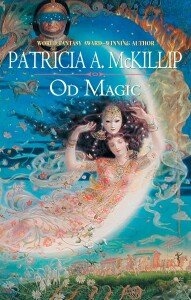 The title of this novel may have been meant to be a pun. While Od is a significant, but not central, character in the book, the magic itself is also meant to be otherworldly, or odd. Well, perhaps it would have been, had the author taken the time to give the magic any rules or definition whatsoever. The magicians and wizards in this book can walk through walls, teleport, read minds, set fires, spy, conjure, animate, and hide people within enchanted embroidery stitches. However, the magic itself seems a given, something that a novel has to have because it is fantasy, so the author declines to describe it in any great detail. After all, the logistics of the supernatural powers are not really relevant to the main plot anyway.
The title of this novel may have been meant to be a pun. While Od is a significant, but not central, character in the book, the magic itself is also meant to be otherworldly, or odd. Well, perhaps it would have been, had the author taken the time to give the magic any rules or definition whatsoever. The magicians and wizards in this book can walk through walls, teleport, read minds, set fires, spy, conjure, animate, and hide people within enchanted embroidery stitches. However, the magic itself seems a given, something that a novel has to have because it is fantasy, so the author declines to describe it in any great detail. After all, the logistics of the supernatural powers are not really relevant to the main plot anyway.
Od, incidentally, is a pale, seemingly immortal giantess who has a penchant for adopting helpless small animals and allowing them to crawl and scurry everywhere about her person, at any time. She always has a flightless bird perched on her shoulder, or a mouse in her pocket, or tiny lizards scampering about her feet, and the like. Several hundred years ago, she saved the kingdom of Numis from invasion, and claims the reward of starting a magic school by the king’s palace in an abandoned cobbler shop. Of course, she evidently has more fun starting schools than actually taking responsibility for them, so after it is built, she vanishes, returning only occasionally, every century or so, to check in on the pupils and teachers.
In the present day, northern hick Brenden, trapped in a void of despair over the death of his parents and the desertion of his older brother, meets Od herself, who requests that he head down to the Numis magic school and become a gardener. Somewhat confused but with nothing better to do, Brenden complies, only to eventually discover that what he initially believed was his clinical depression was actually the feeling of his powerful magic welling up within him.
However, in present day Numis, being a wizard comes with strict responsibilities. Over the years, the King and government have grown increasingly more controlling of the school, and indeed, all the magic conjured within the kingdom. Wizards only learn what the king wants them to learn, and any other type of magic is verboten. Yar Ayrwood, a school professor feeling increasingly dissatisfied with the restrictions placed upon his magic, keeps Brenden on as a gardener without informing the king, or his magically brilliant but socially inept head wizard Valoren, that Brenden has any powers at all.
This ruse works for a while, as the King and Valoren have their hands full trying to keep up with popular street magician Tyramin, who may or may not be a rogue wizard using forbidden magic, and the headstrong, irritatingly silly Princess Sulys, who secretly practices foreign powers (imparted to her by her half-senile great-grandmother Dittany) while trying to come up with ways to wriggle out of her engagement to Valoren. Of course, this ruse is inevitably brought out into the open, and a repetitive, tediously long chase scene evolves, which mainly consists of many people running around like chickens with their heads cut off until they bump into someone else and start a confrontation.
Most of this book is about Brenden, Sulys, and Tyramin’s daughter Mistral, and the impractical quantities of time every other character spends trying to bring these three wayward people back into line. This set-up fails largely due to Brenden, the apparent linchpin of the book, who is at best a non-character. I could never really learn all that much about his personality, other than the fact that he’s terrified to the point of fleeing at the idea of social interaction. A shy young man who keeps to himself, he does it so well that even the readers cannot decipher who he is! Of course, the sad result of his detachment is that throughout his sloppy adventures, I was never really motivated to care about what happens to him, and if I can’t be made to care, why should I bother to read?
As I read more of this novel, it became increasingly apparent to me that the assorted characters weren’t so much people as tools, signposts if you will, there to direct the reader to the Significant Cultural Idea the author managed to convey well enough in the first chapter. It is made very obvious very early on that we are supposed to believe that the idea of the King controlling the magic is a bad idea, that magic is like art and should be free to grow and explore and frolic in the woods with the butterflies and the fawns. Silly authority figures! Don’t you listen to the ideas of liberty and freedom preached by your own precocious children? The time-honoured battle between cautious, restricting conservatism and wild, chaotic artistry is hardly new, and becomes almost redundant when stretched to fit a novel like Od Magic. If sufficiently pared-down, it might have made a passable short story, but as it is, this novel really is odd. And not in the good way.
(Ace Books, 2005)
